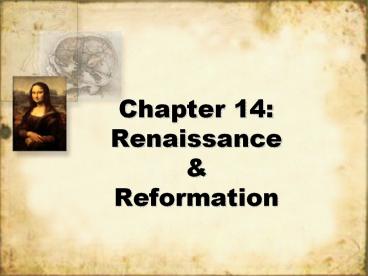Chapter 14: Renaissance - PowerPoint PPT Presentation
Title:
Chapter 14: Renaissance
Description:
Chapter 14: Renaissance & Reformation * * * * * * * * * * * * * * * * * * * * * * * * * * * * * * * * * RENAISSANCE 1300s - 1500 rebirth Section 1: Renaissance ... – PowerPoint PPT presentation
Number of Views:187
Avg rating:3.0/5.0
Title: Chapter 14: Renaissance
1
Chapter 14RenaissanceReformation
2
RENAISSANCE1300s - 1500
- rebirth
3
Section 1 Renaissance in Italy
- Begins in Italy ? spreads north to Europe
Why Italy?
- New interest in Rome and its remainders
- Cities survive the Middle Ages
- North ? Florence, Milan, Venice, and Genoa
(trade manufacturing - Central ? Rome South ? Naples ? ? cultural
center
- Wealthy and Powerful merchant class
- stress education and achievement
- spend lots of
4
Florence
- Center of Renaissance
- Medici Family richest merchant and banking
family - gain full control government
- patron financial supporter of the arts
5
What is the Renaissance?
- Plague ends ? want order ? look back to Greece
and Rome
HUMANISM focus on worldly subjects not
religious focus on intellect and education use
ancient ideas in their world
- Individualism Talents adventure curiosity
- Human experience in the here and now
PETRARCH early Humanist ? collects Greek and
Roman manuscripts write sonnets (love poems)
about a woman
6
Renaissance Characteristics
- Religious figures portrayed in Greek and Roman
style - Everyday individuals
- Columns, arches, domes
- Shading and shadows
- Live models more accurate human portrayal
- Perspective distant objects are smaller to make
a 3-D, realistic painting
7
Perspective
Vanishing point
8
The Totally Masterful New Talents
TMNT
Leonardo
Raphael
Michelangelo
Donatello
9
Donatello
- very Early Renaissance
- Life - size
- Realistic
DAVID
10
Leonardo DaVinci
- Born in 1452
- Renaissance Man
- Painting Art Anatomy Botany Optics
Architecture Music Engineering
11
The Last Supper
12
The Annunciation
Mona Lisa
13
Scientific and Anatomical Study
14
INVENTOR Machine gun Armored tank Cluster
bombs Submarine Calculator Car Use of solarpower
15
Michelangelo
- Born in 1475
- Sculptor, engineer, painter, architect and poet
- Fresco applying paint to fresh plaster usually
on a wall
16
David
Pieta
17
Garden of Eden
The Creation
The Sistine Chapel
18
Sistine Chapel The Last Judgement
19
Raphael
- Studied the works of Michelangelo and Raphael
- Portrays tender Jesus and Madonna
20
School of Athens
21
(No Transcript)
22
Italian Writers
- Catiglione The Book of the Courtier
- - describes how to act as a member of the royal
court describes ideal man and woman
- Machiavelli The Prince
- - guide for rulers on how to gain and maintain
power - - looks at real rulers
- - the ends justifies the means do not have to
keep promises
23
Section 2 The Renaissance Moves North
- Begins in Flanders (near North France)
- Spain, France, Germany, and England begin
Renaissance in 1500s
24
Albrecht Durer
- German Leonardo
- Traveled to Italy to learn about art and
techniques(1494) - Engravings etch design into metal plate with
acid and makes prints. - Portrays religious upheaval.
25
Flemish Painters
- Jan Hubert van Eyck
- - portray townspeople
- and realistic images
- Develop oil paint
26
Pietr Bruegel - Bright colors in portrayal of
peasant life
27
Peter Paul Rubens - Blends ideas of Bruegel and
Italian Renaissance
28
Northern Humanists
- ERASMUS (Dutch)
- - produces New Testament in Greek
- - wants translation of Bible into
- vernacular everyday language of ordinary
people - - chief duty be open minded and of good will
toward others - - The Praise of Folly uses humor to show the
ignorant and immoral behavior of his day
29
- Thomas More
- Wants social reform
- Utopia describes ideal society where men and
women live in peace and harmony everyone is
educated - Utopian describes an ideal society
30
WILLIAM SHAKESPEARE
- 1590-1613
- 37 plays
- Comedies (A Midsummer Nights Dream)
- History (Richard III)
- Tragedies (Romeo and Juliet Othello Macbeth)
- 1,700 new words bedroom, lonely, generous,
gloomy, heartsick
31
CERVANTES
- Spain early 1600s
- Don Quixote mocks chivalry
- Knight who pretends to be on an adventure
- Fights a windmill
32
Printing revolution
- Chinese make books first
- By 1300 papermaking in Europe
- By 1400s Germans invent movable type
- 1456 Johann Gutenberg prints first Bible using
movable type
33
Literacy Revolution
- More books cheaper books more people read and
write!!!!! - Ideas spread! (ppl. are exposed to new things for
the first time)
Protestant Reformation































